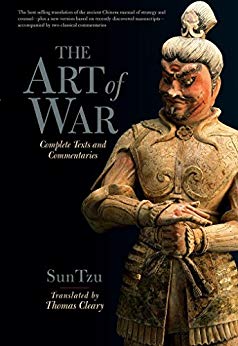

This article is an excerpt from the Shortform summary of "The Art of War" by Sun Tzu. Shortform has the world's best summaries of books you should be reading.
Like this article? Sign up for a free trial here .
What can we learn from the way China’s Jin Dynasty conducted itself in battle? What lessons can the Jin Dynasty teach us about knowing your enemy, exploiting momentum, and governing your forces?
We’ll cover the Jin Dynasty’s military strategies and what we can learn from their successes and defeats.
The Jin Dynasty Reads the Enemy
During the Spring and Autumn Era (722 to 481 B.C.E.), when the Zhou dynasty was beginning to collapse, the Jin Dynasty wanted to overtake the state of Qi, a much smaller state. The Jin Dynasty sent an emissary to scope out the Qi. The emissary, feigning drunk aggression, insulted the Qi’s ruler and tried to force the Qi to disregard etiquette. When the Qi did not react to the insult and did not abide the aggressive demand, the emissary returned home to the Jin Dynasty and told the Jin leadership that the Qi were alert, cautious, and prepared. Therefore, they should not be attacked at this time.
Lesson #1: Know Your Enemy
As the leaders of the Jin Dynasty prove, knowing the strength of your opponent is vital. Once you have fully assessed your opponent’s capabilities, you must understand how to use the information to bolster your position.
If the enemy is operating from a foundation of fullness, meaning all facets of the five traits are viable, you should keep a close eye on them and start organizing your forces. This is what the Jin Dynasty did. Ensure that your side is equally “fulfilled” and aware of possible conflict. Avoid conflict until your enemy’s situation changes.
- When your opponent sees that you mean not to engage in the conflict, a gap may open up. They may relax and provide an opportunity suitable for attack.
- Also, your lack of action may begin to anger the opposing leadership.
- Continue to find ways to anger and irritate your opponent, for decisions made out of anger are often petulant and rash, which can lead to advantages for you.
Once you notice that your opponent is riled up or angry, back off to give them the delusion of superiority or success. They may become arrogant or lax in their judgment, from which carelessness extends.
- If the enemy deems that you are no longer a threat, they will underestimate you or dismiss you as an opponent.
- This arrogance creates the perfect environment for you to successfully attack them.
The Jin Dynasty Exploits Momentum
In 265 C.E., the martial emperor of the Jin Dynasty defeated Cao Cao’s forces in the north and wanted to overthrow another kingdom, the Wu, to gain supremacy in the south. One of the Jin Dynasty’s generals won a small battle against a faction of the Wu’s military. The Jin Dynasty general then asked for permission to carry out a full assault on the Wu. Knowing the large amount of strength, supplies, and men it would take to overthrow the Wu, the Jin Dynasty emperor denied the request, suggesting they wait a year to prepare.
The general, in response, cautioned that their plans against the Wu are now apparent. The Wu could begin preparations during the year in anticipation of an assault. The Jin Dynasty general stated that the momentum was on their side currently, and the likelihood of victory at that moment was large compared to their chances in the future. The Jin Dynasty emperor agreed, and the general was successful in taking over Wu territory easily.
Lesson #2: Use Momentum Strategically
It is not enough to simply feign orthodox behaviors to make your enemy vulnerable to unorthodox attacks. Even if you have organization, bravery, and strength on your side, if you do not adequately address the five traits of success, the result will be actual disorganization, fear, and vulnerability.
Some situations can give a misleading appearance of preparedness. For example, when momentum is on your side, even the fearful can find courage. Relying on this fraudulent strength is foolhardy. If you lose the force of momentum, the courageous can become scared.
Determine the strength of your forces based on merit, then place them appropriately to benefit from momentum. If you position your troops in this way, your strength becomes like a boulder rolling downhill. By the time the boulder reaches the bottom, its velocity makes it unstoppable. This was the strategy of the Jin Dynasty.
The Jin Dynasty Falls to a Strict General
The kingdom of Qi was invaded by Yan and the Jin Dynasty during the Spring and Autumn Era. In response, one of the Qi nobles recommended a man, Rangju, from outside the Qi territory to advise the Qi leadership. Rangju was known for his strength in battle and positive relations with the public where he came from.
However, when Rangju was made a general for Qi, he requested the service of a familiar nobleman to lead the army, since his authority was challenged by the lack of familiarity and trust by both the Qi fighters and people. A nobleman was appointed, but when called upon, his ego led him to attend a farewell bash instead of heading to the military meet-up position.
When he finally arrived, Rangju ordered his decapitation, which was the consequence of any military personnel failing to report on time for duty. The nobleman sent a message to the lord of Qi to be pardoned, but he was killed before the emissary returned with pardon. When the emissary returned, he galloped into camp to deliver the message, another crime according to military conduct. Two of the emissary’s men were killed as a consequence.
On his own now, Rangju led the army on their mission. When they stopped to set up camp, he behaved as one of the soldiers, getting his hands dirty in the preparations, sharing his supplies, and tending to the sick. After a few days, when it was time to enter battle, all of the soldiers were eager to fight for the fair and authoritative Rangju. This news spread to the Yan and the Jin Dynasty, who knew what such loyalty meant. The Yan and the Jin Dynasty armies withdrew from Qi territory.
Lesson #3: Govern Strictly
Having the largest force does not equate to winning the battle. If you have a smaller force, hold your ground, gather the troops you have, keep an eye on the enemy, and prepare a defense.
Even if you have the largest force, if you rely on strength alone, fail to strategize, and take your enemy’s forces for granted, you will be defeated. This happened to the Jin Dynasty.
If your troops are punished without first gaining their trust and loyalty, they will withdraw emotionally and will be hard to mobilize.
Likewise, if your troops become too attached to you and are spared punishment, they will become cocky and difficult to manage.
In sum, treat your troops humanely but govern them strictly. They will respect your command and trust you, thereby becoming loyal and fierce warriors.
———End of Preview———

Like what you just read? Read the rest of the world's best summary of "The Art of War" at Shortform . Learn the book's critical concepts in 20 minutes or less .
Here's what you'll find in our full The Art of War summary :
- How to mislead your enemies to win the war
- Classic examples from Chinese history to illustrate Sun Tzu's strategies
- How to use spies to gather information and defeat your opponents






